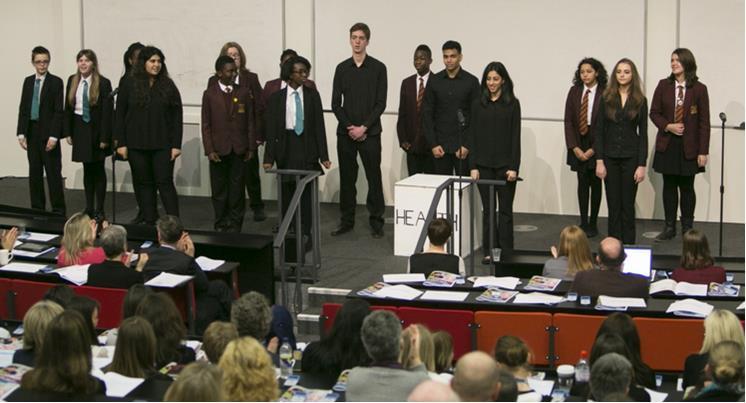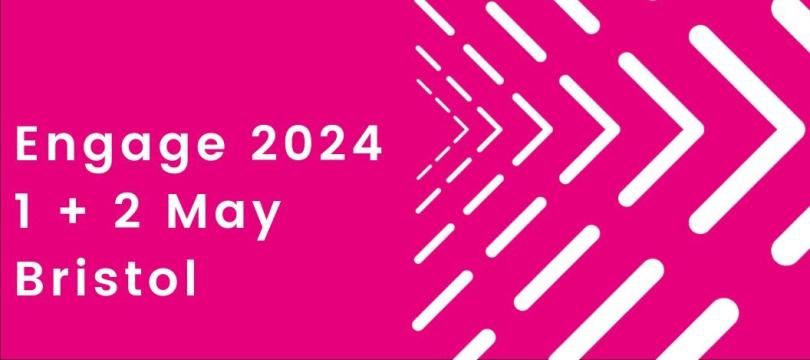Our Health, Our Future
Encouraging a dialogue between local school students, their teachers, researchers and policy-makers in order to generate ideas about research to improve health in school communities.

Parts of Manchester have some of the poorest health records in the country. A girl born in East Manchester today will have 15 fewer years of good health compared to a girl born in Richmond in London. Our Health, Our Future brought together 85 pupils aged 12-17 to discuss their health concerns with professionals and health researchers, using creative methods including drama.
Greater Manchester has some of the best health experts, healthcare professionals and scientists in the country. Yet it also has some of the worst areas for health in England – such as Hulme, Harpurhey, Gorton, Burnage and Moston.
The project enabled students from schools in some of these areas to come together and work with the University of Manchester and NHS researchers based in the Manchester Academic Health Science Centre (MAHSC) to address health challenges.
Project partners
The main partners included Manchester Academic Health Science Centre (MAHSC), Public Programmes at Central Manchester NHS Trust and the Manchester Schools Alliance.
The people involved included:
- Bella Starling, Director of Public Programmes, Central Manchester NHS Trust and Research Associate, University of Manchester
- Gillian Wallis, Director of Training & Education, MAHSC
- John McNerney, Head Teacher and National Leader of Education (Manchester Schools Alliance)
- Sarah Woods, University of Manchester (drama consultant for the project)
Purpose
- To enable a creative dialogue between local school students, their teachers, Manchester Academic Health Science Centre (MAHSC) researcher and policy-makers
- To generate ideas about research to improve health in school communities
- To be a potential catalyst for a partner relationship between MAHSC and the young people affected by MAHSC research
Background
Greater Manchester has some of the best experts, healthcare professionals and scientists in the country; it also has some of the worst health outcomes.
MAHSC wants to improve the quality and effectiveness of patient care, uniting healthcare providers and researchers.
Working with communities and young people is essential to this aim. 'Our Health, Our Future' was an exciting opportunity to stimulate a creative and innovative way for MAHSC to partner Manchester schools to tackle public health issues and include the perspectives of young people in shaping its research, for the first time.
Public health research is often about thinking about lifestyle choices and our own behaviours and it can be linked to diet, smoking, alcohol, vaccinations and campaigns around breastfeeding and hand-washing, for example.
Approach
The project team wanted to engage schools in poor health areas as these are often neglected when it comes to public engagement.
At the heart of the project is research aimed at preventing disease and preventing mental health conditions.
The pupils came together in schools workshops to work alongside health experts via a series of hands-on activities. A drama developed by sixth former also inspired the pupils to debate the question: ‘How should MAHSC spend £10 million to address health in your community?’. The students went on to present their ideas to the main MAHSC conference for healthcare professionals from across Manchester.
The Public Programmes team is embedded within research and healthcare at Central Manchester NHS Trust and the University of Manchester. They drew on their extensive experience of working with young people (eg. Genomics for Schools, Changing Futures; including with ‘harder to reach’ young audiences e.g. Seeking Perfection); supporting researchers to value and deliver public engagement; and working with arts-led approaches.
Students devised imaginative approaches to improve health problems they cared about. This approach not only engaged schools with public health research, but also MAHSC professional communities with the value of public engagement.
Evaluation
Regular steering group meetings took feedback about the direction of the programme from each of the partners.
Quantitative and qualitative research was used including surveys of schools involved and the conference, interviews with project partners, teachers and young people.
Social media feedback was analysed and captured.
The evaluation showed every one of the teachers involved rated the schools conference either good or very good, and that the students' presentations were rated as the best bit of the MAHSC conference.
Lessons learned
The team learned that:
- Drama was a powerful means of reaching young people;
- Listening to the young people’s ideas was important so placing an emphasis on this at the conference was valued;
- The time allowed to organise the conference was too tight with hindsight;
- Hands-on interactive sessions worked better than longer presentations;
- Researchers were full of enthusiasm and enjoyed the conference.
Legacy
The film produced about the project has proved popular in schools – it shares the findings, increasing the reach of the project.
The project methodology has inspired other projects – for example a study into mental health among young people in Oldham
It has raised the profile for the MAHSC in schools
It gave rise to the Young Friends of MAHSC initiative, which is part of the Friends of MAHSC initiative.
Importantly, it influenced the strategic direction of major health research partners in Manchester to focus on engaging with diverse communities.
Contact
For further information, please see the project webpage or contact Bella Starling.
